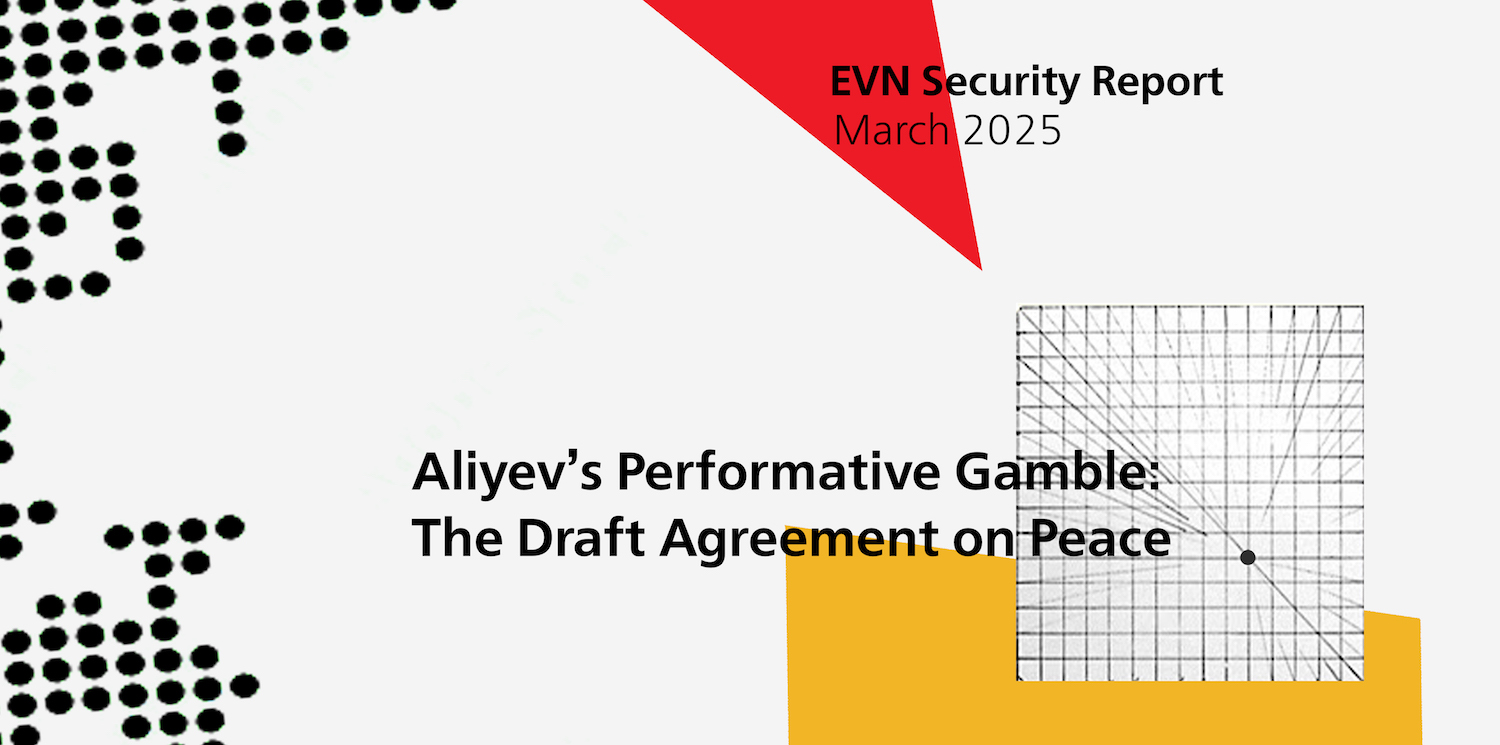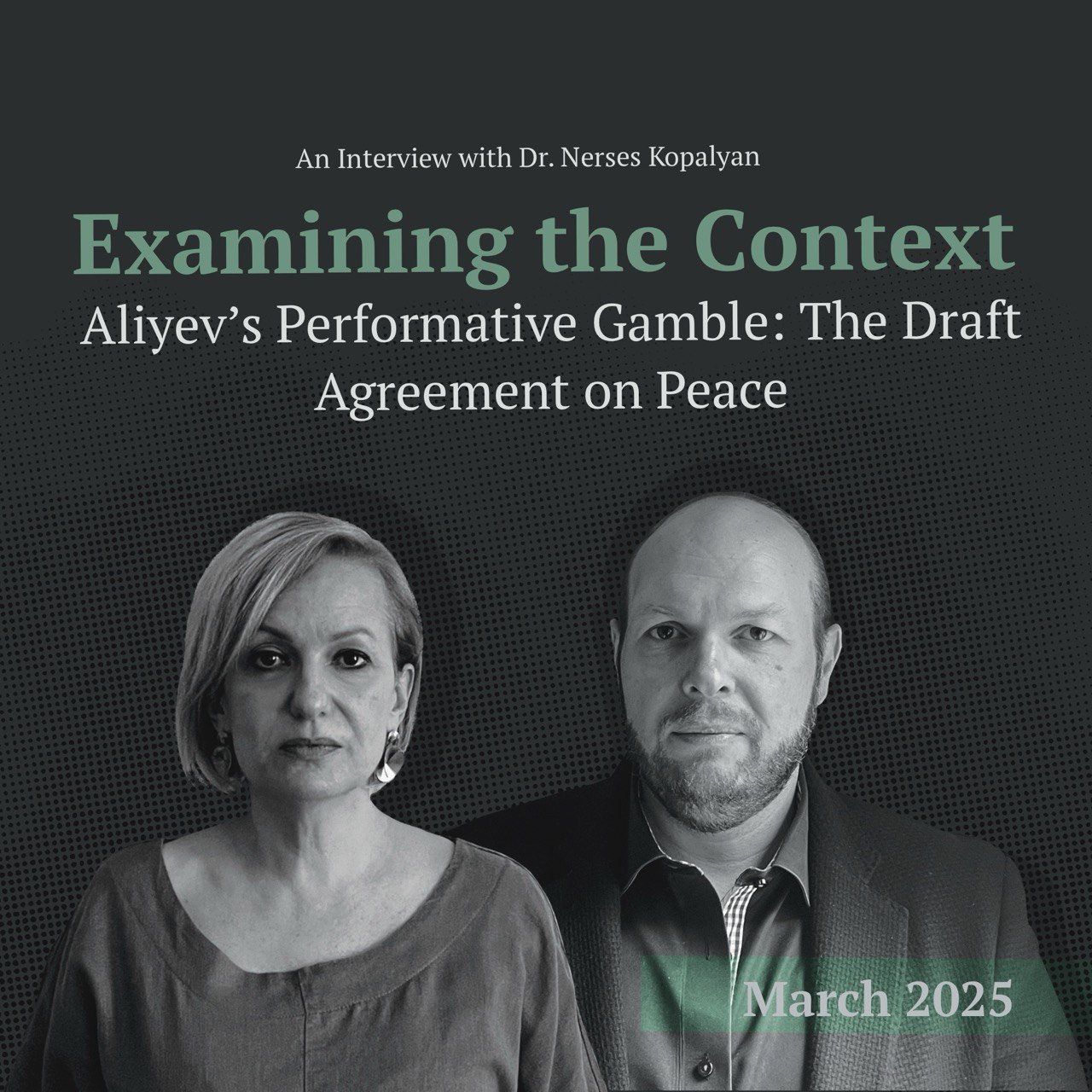Listen to the EVN Security Report.
Azerbaijan’s Ilham Aliyev sent shockwaves through the region and the international diplomatic community with a strategic attempt at collapsing the dichotomy between war and peace, as he attempted to garner the attention of the Trump Administration, while at the same time escalating tensions with Armenia. What appears to be an inherent contradiction in terms was precisely an effort by Aliyev to rupture the dichotomy: speaking of peace yet seeking war. In a highly unusual move, designed to both catch Armenia off guard while also confuse much of the diplomatic world, Azerbaijan’s Foreign Ministry unilaterally released a statement that all 17 articles to a draft peace agreement had been concluded, including the final two unresolved issues that Armenia “conceded.” Having been the subject of much international criticism for its unconstructive and obstructionist approach to peace, Baku’s preemptive release of “progress” in the peace process confounded much of the diplomatic community: why is the one actor who has continuously refrained from agreeing to sustainable peace the one releasing news of this “breakthrough?” Further, why was the release of this important “milestone” done unilaterally without its negotiating partner, and why was this unexpected “breakthrough” followed with a set of incoherent ramblings, vitriols, and untenable preconditions by President Aliyev?
It’s Not About Peace, It’s About Getting America’s Attention
The statement by Azerbaijan’s Foreign Ministry was not about peace, but rather, a desperate attempt to tap into the peace narrative that they have learned is so vital to Trump’s America First foreign policy. Thus, the statement about the draft agreement on peace was not directed at Armenia, but rather, the White House. In essence, Aliyev was strategically seeking to transition the rhetorical posturing of Baku into the domain of peace, and its unilateral declaration was designed to give substance to this posturing, with the extensive media and international attention that would come with it. Having completely lost the narrative in Washington, Brussels, and much of the West, Aliyev remains extremely concerned at his government’s inability to establish communication or serious level of engagement with the Trump White House. By pivoting, even performatively, and taking the lead on the peace discourse, Aliyev was desperately attempting to manufacture geopolitical buzz under the hope that it would place Azerbaijan on America’s radar. The almost-dismissive, and even inchoate, response to Armenia’s highly positive reaction to this development immediately revealed the facetious nature of what Aliyev was seeking to achieve.
At the same time, Baku, appears to have been caught off guard by the exceedingly positive response from the international community, with US, France, Germany, China, UK, the EU, the UN, and even Russia, along with 30 other countries, not only praising this development, but concretely noting that the agreed document must now be signed. Aliyev’s strategic endeavor of paying lip-service to peace yet maintaining conflict-persistence became an exercise in self-negation. When Armenia immediately accepted and agreed to sign, earning praise from the international community, particularly the United States (Aliyev’s direct target), Aliyev resorted to a revolving set of exorbitant preconditions to allow himself flexibility from being pigeonholed. Aliyev’s construction of a range of artificial obstacles to the signing of the peace agreement was followed by a week of kinetic diplomacy, as Baku heightened its hybrid operations by baselessly accusing Armenia of consistent ceasefire violations, claims that, interestingly, had already been preemptively echoed by Aliyev’s mouthpieces.
The triangulation of Baku’s hybridity pattern, which appears to have been hastily constructed compared to its previous, more methodical operations, was self-revealing:
-On March 11, Aliyev’s media mouthpiece released a report that the “region was at the brink,” as Armenia was “planning to initiate war in April.”
-Yet two days later, on March 13, Baku unilaterally declares that the two sides have agreed to a draft peace agreement.
-On the same day of declaring what was perceived by many as a breakthrough, Aliyev, at the Baku Forum, unleashes a vitriolic barrage against Armenia, accusing it of being untrustworthy, warprone, and incapable of peace.
-Precisely two days after the international community praised the agreement reached by both sides, along with numerous Western capitals praising Armenia for its constructive and compromising posture, Baku, starting from March 16 to March 21, undertook an intense campaign to escalate tensions.
Aliyev’s calculations appear to have been hinged on three overarching presuppositions:
- The unilateral declaration of the draft agreement will allow Baku to get ahead of the news and take the lead, thus accruing relevant international attention, allowing Aliyev to situate himself within Trump’s radar as a peace-seeking leader.
- Operating under the assumption that Trump’s national security team is neo-isolationist with limited bandwidth for developments in the South Caucasus, a contradictory initiation of coercive and kinetic diplomacy against Armenia would fly under Washington’s radar, thus allowing Aliyev to use the peace discourse as a performative tool to gain access to the White House, while having no concrete commitments or obligations of signing anything with Armenia.
- Operationalization of artificial obstacles via preconditions can allow for interoperability with its hybrid assaults against Armenia, allowing Aliyev to speak to Washington with a forked-tongue: Baku is seeking peace, as its unilateral declaration demonstrates, yet it is Yerevan, with its violations of the ceasefire and revanchist aspirations, that is refusing to agree to Alyev’s “constructive” preconditions.
Performativity and Strategic Failure
While Baku’s abrupt declaration of a conditional agreement to the draft text and the subsequent game plan of utilizing this dichotomous strategy to secure access to Trump’s White House may appear to have been a bold strategic endeavor, in essence, it was purely a desperate undertaking born out of frustration. As of this writing, Baku has failed to make any inroads with the Trump White House, regardless of the immense resources and funds they have been utilizing in Washington DC. Further, considering Aliyev’s shortsighted attacks against the State Department and America’s other institutions and programs within the domain of foreign policy, he remains strategically handcuffed with respect to institutional access. Thus, his only hope rested on devising a performative endeavor that would be welcomed by Trump’s inner circle, and considering the fact that matters specific to the South Caucasus are handled by the National Security Council within the White House, engagement with the NSC, as a foot-in-the-door approach, was the initial goal. That this engagement collapsed on its face was the one factor that Aliyev and the head of his Foreign Policy Affairs Department, Hikmet Hajiyev, had not accounted for.
The call between Hajiyev and National Security Advisor Mike Waltz, and the broad strategy that Baku had constructed to secure this engagement, was an unmitigated disaster. Waltz’s statement of the call was not only a reflection of how Baku’s strategy of instrumentalizing the peace discourse to gain White House access had failed, but more so, Waltz stipulated demands upon Baku that specifically enraged Aliyev. Waltz categorically stated that “conflict in the South Caucasus must end,” and that he directly informed Hajiyev that they “should finalize this peace deal now, release the prisoners, and work together to make the region more secure and prosperous.” In essence, not only did Waltz call out Aliyev for his bluff on instrumentalizing the peace narrative, but more so, made it clear that Baku must walk the walk. In no uncertain terms, Baku’s false narrative that Armenia is an aggressive or revanchist actor that refuses to genuinely proceed on the path to peace was deemed intellectually insulting by Waltz and his national security team. But even more disturbing for Aliyev was Waltz’s demand for the release of Armenian prisoners of war, an extremely sensitive subject for the Aliyev regime. The White House’s clear position on this matter further shattered Aliyev’s game plan.
A subsequent press release of Secretary of State Marco Rubio’s phone call with Prime Minister Pashinyan on March 25 further reified not only America’s developing policy and doctrine towards the South Caucasus, but more so, the overall failure of Aliyev’s strategic initiative of winning over the Trump Administration. The State Department’s reading of the call explicitly stated that the nature of the discussion was one between “strategic partners,” and that these two strategic partners, Armenia and the United States, “agreed that escalation of any form in the South Caucasus is unacceptable.” Between Waltz’s stipulatory language and Rubio’s unambiguous declaration, the overall position of the White House became quite clear: the United States demands peace in the South Caucasus, the disruptive and destabilizing actor remains Azerbaijan, and Baku will do well to refrain from any escalatory behavior. In triangulating developments between March 13, when Baku made its unilateral declaration, and March 25, when Secretary Rubio released the reading of his call with Prime Minister Pashinyan, Aliyev went from operationalizing his dichotomous strategy to diplomatically suffocating under the weight of his incontrovertible contradictions.
The False Logic of Concessions
The body of literature in bargaining theory demonstrates that mutually acceptable agreements always contain concessions. However, the politicization of concessions raises two key questions: what qualifies as a “concession” and what are the costs of rejecting concessions as a matter of political principle? An important part of this phenomenon is the underlying logic of rewards, that is, is the enemy being rewarded when one side makes concessions? Research on bargaining range notes that if the immediate and long-term interests of a party are secured through concessions, decreasing them actually produces a distributive disadvantage, thus harming the immediate and long-term interests of the negotiating party. Further, the distributive power capabilities of the negotiating parties remain fundamental to the structure of concessions: assuming parity in concessions between the weaker party and the stronger party is a self-negating postulate. That is, the stronger party, by virtue of the bargaining range, cannot and will not make concessions at the same degree as the weaker party. However, negotiation outcomes are not determined by keeping score on concessions as if it is some kind of a sports game, but rather, on qualifying the relationship between modality of concession and attainment of the conceding party’s underlying objective. Thus, an actor may make numerous concessions and achieve its set objective, while the opposing actor may concede less, yet fail to achieve its set objective. Within this context, a conflict ensues between two competing logics: one that views concessions as a means of securing net-positive outcomes and another that falsely frames concessions as politically unacceptable rewards for the enemy. The latter approach, by obsessing on the idea of concessions rather than their strategic value, ultimately leads to the rejection of potentially beneficial agreements.
Unfortunately, Armenia’s inept anti-democratic opposition, its ill-informed Diasporan allies, and a faux war party that speaks of principle yet has no intention of fighting against a stronger enemy, have formed an ecosystem revolving around the false logic of concessions. In essence, the prevailing discourse within this faction contends that any act of concession in the negotiation process to Azerbaijan is both an act of rewarding the enemy as well as an act of capitulation. This group does not qualify concessions as a negotiating tool designed to achieve the bottom-line objectives of Armenia, but rather, as a conspiratorial act by a Western-puppet regime that endeavors to casually surrender the interests of Armenia to Azerbaijan. Between artificial valor and intellectual dishonesty, this faction of pro-Kremlin parties and Dashnak diasporan cliques have attempted to define the Armenia-Azerbaijan negotiation process not through Armenia’s bottom-line objectives, but rather, through the false logic of concessions. Unbeknownst to them, they have assumed an inverse version of precisely how the Aliyev regime approaches the negotiations: whereas these factions speak of sets or ranges of concessions, Aliyev thinks of a singular modality of concession, and that is the concession of agreeing to peace.
Azerbaijan’s unilateral declaration on the draft peace agreement was not directed at Armenia: Aliyev was talking to the United States, while separately speaking to Armenia at the Baku Forum. Aliyev considers the signing of a peace treaty as the ultimate concession, and by extension, a defeat for him. Thus, as a connoisseur of the false logic of concession, Aliyev, as the stronger party, has nothing to concede, except his bottom-line objective: Armenia’s regional subjugation. From Aliyev’s perspective, the concessions that the various Armenian factions complain about are petty compared to the ultimate concession that he has to make. For this very reason, unless having no other options, Aliyev will never sign a peace agreement.
Aliyev’s end goal is the subjugation of Armenia through conflict-persistence and managed instability. Armenia’s end goal is a peace treaty that brings security and stability, which will allow Armenia to develop and progress. In this context, Armenia’s set of concessions contribute to its bottom-line, while Aliyev’s only available act of concession will completely rupture his bottom-line. As such, considering the fact that Aliyev is able to continuously achieve his objectives without a peace treaty, and more so, conceding the fact that a peace treaty, in truth, actually limits and curtails Aliyev’s objectives, the very act of agreeing to peace would be, for Aliyev, the ultimate act of concession and defeat.
Qualified within this domain of strategic thinking, Aliyev will refuse to sign not because, in principle, he opposes or has an aversion to the very concept of peace, but rather, because peace contradicts not only his immediate interests, but also the investments he has made the last two decades in building Azerbaijan into what it has become. Aliyev cannot become the region’s mini-hegemon, or be the singular power player in the South Caucasus or sustain his political system, which has been constructed on conflict-persistence with Armenia, if he signs a peace treaty. Baku has invested immense resources and decades of hard work in establishing the power disparity that it enjoys against Armenia, and by asking Aliyev to sign a peace treaty, from his lens, he is being asked to concede his ability at conflict management, to act as mini-hegemon, to behave unrestrained, to exercise his power capacity, and his ability to maintain, which to him is his greatest achievement, the power asymmetry with Armenia.
In essence, peace takes away Aliyev’s domestic political oxygen, as he nourishes the institutions of his state and its patronal autocratic system by maintaining conflict with Armenia. And just as similarly, peace takes away Aliyev’s geopolitical bread and butter, for his entire foreign and security system is designed to be in a state of war with Armenia. It is precisely for these reasons that signing a peace treaty is deemed by Aliyev as the ultimate concession. This is why he concocted the stratagem that he did: speak performatively of peace with the U.S., but make no concessions of peace with Armenia. That this strategy failed, for the moment, is quite evident both in Baku and Washington, DC. That this strategy also revealed that Aliyev will not sign a peace agreement unless rigorously forced is beyond evident. Thus, if there is to be peace in the South Caucasus, one thing has become clear in Washington: either Aliyev concedes to peace, or he was trying to pull the wool over the eyes of Trump’s White House.
EVN Security Report
Towards an Early Warning System: Anticipating Threats and Preparing for Attacks
Armenia faces a complex security landscape, from immediate physical threats posed by Azerbaijan to multi-layered hybrid attacks. In this month’s security report, Nerses Kopalyan examines how Armenia is developing an advanced early warning system to shift from a reactive to a proactive defense strategy, leveraging information processing, intelligence, technology and strategic forecasting.
Read moreWhy Aliyev Thinks He Has to Attack Armenia Soon
Ilham Aliyev considers the new regional balance of power his greatest geopolitical success and the preservation of this power disparity with Armenia his highest priority. As Armenia rearms and seeks to develop deterrence capacity, Aliyev deems this a threat to his grand strategy, thus heightening the probability of strategic strikes against Armenia.
Read moreEVN Security Report: November 2024
Looking at the emerging contours of the Trump Doctrine and its implications for the South Caucasus, Nerses Kopalyan examines competing policy orientations within Trump's incoming administration and how these will shape U.S. engagement with Armenia amid broader global and geopolitical priorities.
Read moreEVN Security Report: October 2024
Tracing decades of overreliance on Russia, systemic neglect of military modernization, and policy failures by successive Armenian administrations, Nerses Kopalyan presents a critical analysis of how Armenia’s security apparatus stood by as Azerbaijan became a regional military power.
Read more












Excellent analysis and positive arguments.